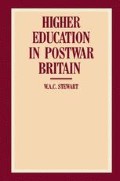Abstract
The managed economy of wartime shaded into the economy of the new Labour government of 1945, carrying forward the principles of Beveridge in welfare state legislation through national insurance, public assistance, the health service, housing and tax reform. They introduced part of their nationalisation policy in banking and public services, but they did not try to develop a programme of manpower planning, and moved instead towards a form of wages policy coupled with controls on profits. In other words, they accepted the realities of a mixed economy and brought the contributions and demands of organised labour into the economic transition from war to peace.
Access this chapter
Tax calculation will be finalised at checkout
Purchases are for personal use only
Preview
Unable to display preview. Download preview PDF.
Notes
For fuller reference see: D. Butler and D. Stokes: Political Change in Britain: the Evolution of Electoral Choice, London, 1974;
S. H. Beer: Modern British Politics: A Study of Parties and Pressure Groups, London, 1965;
N. Harris: Competition and the Corporate Society: British Conservatism, the State and Industry 1945–64, London, 1972.
This residential university college in mid-Wales was founded in 1822 by Thomas Burgess, Bishop of St David’s, and took its first students in 1827. It claims to be the oldest university institution in England and Wales after Oxford and Cambridge. A royal charter was granted in 1828 and later charters empowered it to award its own BD in 1852 and BA in 1865 and to admit students without religious test. It was affiliated to Oxford in 1880 and Cambridge in 1883 but remained independent of the University of Wales when it was formed in 1893 from the federation of the three Welsh colleges at Aberystwyth, Bangor and Cardiff. Swansea was established in 1920. St David’s College was accepted for grant by the UGC in 1961 and in 1971 suspended its independent degree on becoming a constituent college of the University of Wales. Women were first admitted in 1965. See D. T. W. Price: History of St David’s University College 1, Cardiff, 1977.
Edward Boyle: Government, Parliament and the Robbins Report, Sir Joseph Payne Memorial Lecture, 1979. Lord Boyle was Vice-Chancellor of the University of Leeds from 1970 until his death in 1983.
D. Daiches (ed.): The Idea of a New University: An Experiment in Sussex, London, 1964.
Asa Briggs(later Lord Briggs): ‘Drawing a New Map of Learning’, The Idea of a New University, London, 1964, p. 63.
A. E. Sloman: A University in the Making, Reith Lectures, 1963, BBC, London, 1964.
Lord Robbins: Higher Education Revisited, London, 1980, p. 22.
Kathleen Jones: ‘Student Life and Work Encompassed’ The Times Higher Education Supplement, 27 January 1984, p. 13.
The Hon. Justice Latey, The Age of Majority, HMSO, July 1967, Cmnd 3342.
From his final Report to Court in 1972 p. 11. See C. Storm-Clark, ‘Newman, Palladio and Mrs Beeton: The Foundation of the University of York’, in C. H. Feinstein (ed.), York 1831–1981, York, 1981, pp. 285–310.
See P. F. R. Venables: Higher Education Developments: the Technological Universities 1956–1976, London, 1978.
See also T. Burgess and J. Pratt: Policy and Practice: the Colleges of Advanced Technology, London, 1970.
See W. Perry: Open University, Open University Press, 1976. Foreword written by Harold Wilson, p. xi. I am glad to acknowledge the help I have obtained from Lord Perry’s most valuable book, as these pages will show. During the 1970s I was for several years one of the CVCP representatives on the Council of the OU and saw something of its working and achievements from the inside. The OU has produced a comprehensive video of its own beginnings.
A University of the Air, HMSO, 1966, Cmnd 2922. I have consulted the wide range of services provided by the OU, including the volumes and digests of statistics. Also J. Tunstall: The Open University Opens, London, 1974;
J. Ferguson: The Open University from Within, London, 1975 and ‘The Open University — So Far’ in Interdisciplinary Science Reviews, Vol. 8, No. 4, 1983, pp. 334–44. Professor Ferguson was the first Dean of Arts, 1969–79, whose help I acknowledge.
For a critical study of ‘the revolution in English life in the fifties and sixties’, see C. Booker: The Neophiliacs, London, 1969.
A detailed account of this sequence of events has been written up by the then Secretary of the School. See H. Kidd: The Trouble at LSE, London, 1969.
My very brief reference here does no justice to an intricate and scrupulous inquiry up to early 1968, as Mr Kidd recounts it. See also T. Blackstone and others: Students in Conflict: LSE in 1967, London, 1971, a research-based symposium on this period and the views of members of the School at the time.
In different contexts see Chapter 8 of Lord Robbins: Higher Education Revisited, London, 1980
P. Hoch and V. Schoenbach: LSE: The Natives are Restless, London, 1969. This is an account of the period by leading activists.
For the broader background to strategic struggles within the Labour Party see D. and M. Kogan: The Battle for the Labour Party, London, 1982.
Author information
Authors and Affiliations
Copyright information
© 1989 W. A. C. Stewart
About this chapter
Cite this chapter
Stewart, W.A.C. (1989). The Universities. In: Higher Education in Postwar Britain. Palgrave Macmillan, London. https://doi.org/10.1007/978-1-349-07064-0_9
Download citation
DOI: https://doi.org/10.1007/978-1-349-07064-0_9
Publisher Name: Palgrave Macmillan, London
Print ISBN: 978-1-349-07066-4
Online ISBN: 978-1-349-07064-0
eBook Packages: Palgrave Social & Cultural Studies CollectionSocial Sciences (R0)

